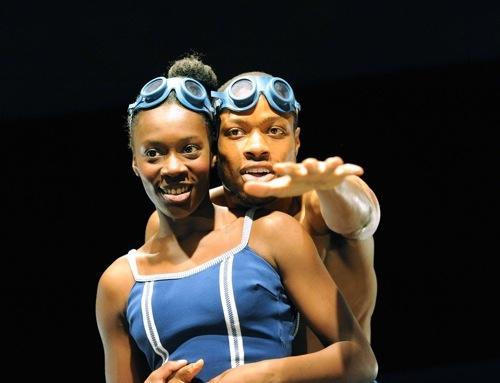Since Eurydice was the ill-fated wife of Orpheus, master musician, it’s not inappropriate that this reworking of the classical myth by the award-winning US writer Sarah Ruhl should be so much like a song. Her language has a kind of blunt lyricism, and the action of her drama, with its recurrent waves of water imagery, has a vivid, surreal fluidity that eddies and flows like an elusive melody. Sometimes the playfulness is beguiling; sometimes it merely seems arch. And in Bijan Sheibani’s stark production, it is too deliberate, and too rarely genuinely moving, to permit Ruhl’s themes of love and loss to resonate.
We meet the two lovers frolicking by the sea, clad in 1950s swimming costumes. Satin-skinned, smooth-limbed, bright-eyed, Ony Uhiara’s Eurydice and Osi Okerafor are the living evocation of unblemished youthful romance; but already faint doubts are beginning to taint their bliss. She likes books, conversation, fresh ideas; he has a head so full of music that he doesn’t always hear her. Still, they are passionately connected, and to prove it, Orpheus ties a loop of string around Eurydice’s wedding-ring finger: a tiny tether he hopes will bind her to him forever, as well as a symbol of devotion.
That little string ring fails to prove strong enough; Eurydice is lured away from their wedding reception by a flash, sinister stranger who claims to have a letter for her from her dead father (Geff Francis). Sensing the man’s intentions are unsavoury, she flees from him, and tumbles down a long staircase – all the way into an elevator, whose ceiling rains Lethe water, and whose doors open in the Underworld. All memory washed away by that shower from the river of forgetfulness, she doesn’t recognise her father when he appears. Slowly, painfully, he reawakens her consciousness, while building her a room to shelter in from string – an echo of Orpheus’s token, and an act of love as tender as Ariadne’s gift to Theseus of a ball of thread, used to guide him out of the Minotaur’s labyrinth. And back in the land of the living, a distraught Orpheus tries to fathom how he will ever be reunited with his stolen bride.
There are moments of potency in Sheibani’s production: wedding guests in black and white, dancing the jitterbug amid glittering, jewel-bright drops of water from a leaping fountain; a Chorus of unyielding Stones, elegant in silver-grey brocade, who mock the newcomer’s travails in Hades, and a taunting, infantile Lord of the Underworld who rides a red tricycle; the eventual instant of recognition between father and daughter, falling into each other’s arms in a desperate embrace. But on the whole, Sheibani chooses to let Ruhl’s language do the talking. When it’s not illuminated by the dancing liquid that rises from beneath its metallic grille floor, Patrick Burnier’s hard-edged set is inhospitably stark, and that restraint extends to the performances: rare glimpses of emotional intensity aside, they have a sense of self-conscious recitation. It’s a great shame, because the undercurrents of Ruhl’s writing – the transition from child to woman, the eschewing of the father’s protection for the husband’s passion, the fading of romantic love and the growth of something more enduring, the agony of bereavement, both emotional and actual – ought to offer some poignancy. But Sheibani never quite succeeds in finding an antidote to the playwright’s tendency towards the effortful; as a result, the production is intriguing, but it’s largely unaffecting.
- Eurydice is at the Young Vic until 5 June













Add comment